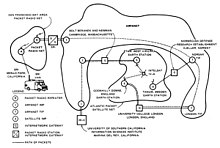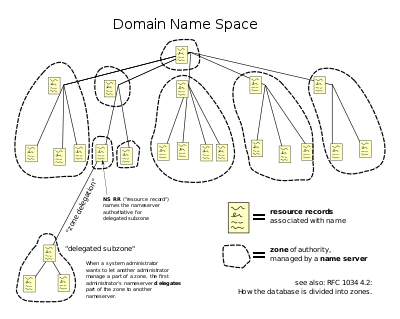-
Use Cases
-
Resources
-
Pricing
Early development and origins
Birth of ARPANET
Oct 29, 1969
% complete
ARPANET, the precursor to the modern internet, was established when the first message was sent between two computers at UCLA and Stanford Research Institute, marking the birth of a network that would revolutionize global communication.
Image source: ARPANET

TCP/IP Protocol Development
1973
% complete
The development of the TCP/IP protocol, a set of rules that allows computers to communicate over networks, provided a standardized framework for data transmission and became the foundation of the modern internet.
Image source: Internet protocol suite

Domain Name System (DNS) Creation
1983
% complete
The creation of the Domain Name System (DNS) introduced a hierarchical naming system for websites, enabling users to access websites using human-readable domain names instead of numerical IP addresses.
Image source: Domain Name System

Expansion and commercialization
Commercialization of the Internet
1989
% complete
The lifting of restrictions on commercial use of the internet in 1989 paved the way for its rapid commercialization, leading to the establishment of commercial internet service providers and the growth of e-commerce.
World Wide Web Invention
Mar 12, 1989
% complete
Tim Berners-Lee's invention of the World Wide Web revolutionized the internet by introducing a user-friendly system of interconnected hypertext documents accessible via the internet.
Image source: World Wide Web

Launch of Mosaic Web Browser
Jan 23, 1993
% complete
The release of the Mosaic web browser, with its graphical user interface and support for images, played a pivotal role in popularizing the World Wide Web and making it more accessible to a broader audience.
Image source: Mosaic (web browser)

Introduction of Commercial Web Browsers
1994
% complete
The introduction of commercial web browsers, such as Netscape Navigator and Internet Explorer, made web browsing more user-friendly and contributed to the widespread adoption of the internet.
Image source: Web browser

Technological advancements and innovations
Launch of Google
Sep 4, 1998
% complete
The launch of Google, a revolutionary search engine, provided users with a more efficient way to find information on the internet and became a dominant force in the online world.
Image source: Google

Introduction of iPhone
Jun 29, 2007
% complete
The introduction of the iPhone, with its intuitive touchscreen interface and mobile internet capabilities, revolutionized the smartphone industry and accelerated the mobile internet revolution.
Image source: IPhone

Launch of Bitcoin
Jan 3, 2009
% complete
The launch of Bitcoin, a decentralized digital currency, introduced the concept of cryptocurrencies and blockchain technology, revolutionizing the financial industry and opening up new avenues for decentralized applications.
Image source: Bitcoin

Introduction of Internet of Things (IoT)
2010 - 2035
% complete
The introduction of the Internet of Things (IoT) brought the concept of interconnected devices and objects, enabling the integration of everyday objects with the internet and opening up possibilities for automation and smart systems.
Image source: Internet of things

Social and cultural impact
Rise of Social Media
2000 - 2025
% complete
The rise of social media platforms, such as Friendster, MySpace, and Facebook, revolutionized online communication, enabling people to connect, share, and interact on a global scale.
Image source: Social media

Launch of YouTube
Feb 14, 2005
% complete
The launch of YouTube, a video-sharing platform, transformed the way people consume and share video content, giving rise to a new era of user-generated media and online video culture.
Image source: YouTube

Launch of Instagram
Oct 6, 2010
% complete
The launch of Instagram, a photo and video-sharing platform, revolutionized visual storytelling and social media engagement, influencing contemporary culture and transforming the way people share moments online.
Image source: Instagram

Arab Spring and Social Media
Dec 18, 2010
% complete
The Arab Spring uprisings, which spread across the Middle East and North Africa, highlighted the power of social media as a tool for organizing protests, spreading information, and mobilizing social and political change.
Image source: Arab Spring

Snowden Leaks
Jun 5, 2013
% complete
The revelations by Edward Snowden about mass surveillance programs conducted by intelligence agencies sparked a global debate about privacy, surveillance, and the balance between security and individual rights in the digital age.
Image source: Edward Snowden

COVID-19 Pandemic and Digital Transformation
2020
% complete
The COVID-19 pandemic accelerated the digital transformation across various sectors, highlighting the internet's importance for remote work, online education, telemedicine, and digital entertainment.
Image source: COVID-19 pandemic

Key Facts
- The precursor to the internet, ARPANET, was created in 1969 by the U.S. Department of Defense.
- The first email program, known as SNDMSG, was developed in 1971.
- The birth of the World Wide Web occurred in 1989 when Tim Berners-Lee proposed the concept.
- The first website, info.cern.ch, went live on August 6, 1991.
- The dot-com bubble burst in 2000, causing the valuation of many internet companies to plummet.
Source
This History of the Internet timeline was generated with the help of AI using information found on the internet.
We strive to make these timelines as accurate as possible, but occasionally inaccurates slip in. If you notice anything amiss, let us know at [email protected] and we'll correct it for future visitors.
Create a timeline like this one for free
Preceden lets you create stunning timelines using AI or manually.
Customize your timeline with one of our low-cost paid plans
Export your timeline, add your own events, edit or remove AI-generated events, and much more
Free
$
0
free forever
No credit card required.
Basic
$
10
/month
billed annually
Cancel anytime.
Pro
$
16
/month
billed annually
Cancel anytime.
Common Questions
Can I cancel anytime?
Yes. You can cancel your subscription from your account page at anytime which will ensure you are not charged again. If you cancel you can still access your subscription for the full time period you paid for.
Will you send an annual renewal reminder?
Yes, we will email you a reminder prior to the annual renewal and will also email you a receipt.
Do you offer refunds?
Yes. You can email us within 15 days of any payment and we will issue you a full refund.
What if I have more questions?
Check out our pricing docs or send us an email anytime: [email protected].